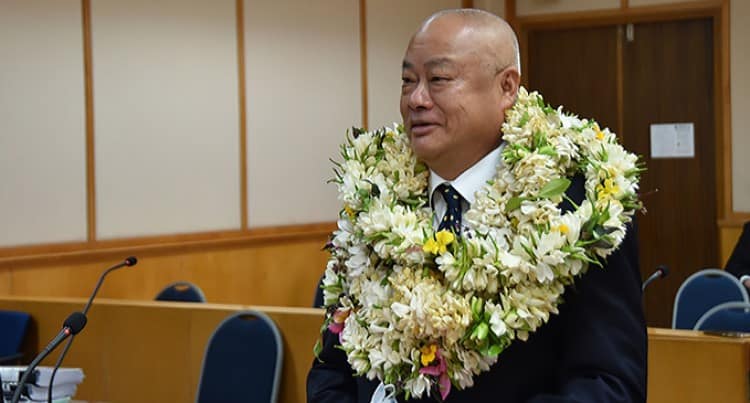Fiji’s Attorney-General Graham Leung has urged Pacific law officers to address the region’s pressing legal challenges, highlighting climate change, digital transformation, and rising authoritarianism as critical issues for the Pacific’s legal framework.
“This meeting isn’t just about sharing experiences; it’s a chance to deepen our collaboration on issues that profoundly affect the daily lives of Pacific Islanders,” Leung said in his opening remarks at the 43rd annual meeting of the Pacific Islands Law Officers Network(PILON) in Nadi.
Leung’s call came as PILON marked another year of bringing together Pacific legal minds to share expertise and establish cross-jurisdictional strategies. Since its inception in 1981, PILON has evolved into a significant legal network, initially focused on Pacific Island legal cooperation and later expanding to address shared issues in law and justice.
However, Leung didn’t mince words in his assessment of the forum’s challenges.“Our people and constituents have every right to ask what we have achieved in real terms that makes a difference to their lives,” he said, urging members to do more than merely convene and socialise. For PILON to be relevant, he argued, it must focus on tangible outcomes that strengthen justice and the rule of law.
Among PILON’s current strategic priorities for 2024-2026 are corruption, gender-based violence, and cybercrime, which Leung described as urgent yet only a fraction of the issues that demand PILON’s attention. Notably absent from the agenda, he pointed out, is climate change, an issue he described as critical for the Pacific’s survival.
“Climate change isn’t just an environmental issue—it’s an existential threat that could roll back decades of progress and saddle future generations with insurmountable costs,” Leung said.
The impact of climate change, he warned, stretches far beyond rising sea levels, touching on human rights, economic stability, and even the survival of many Pacific Island nations.
Leung expressed concern that PILON had given limited attention to climate change over the years. He pointed to the recent 53rd Pacific Islands Forum in Tonga, where leaders expressed their concern over climate impacts.
“It’s striking that climate change barely rates a mention in past PILON publications,” he said. Referring to the International Court of Justice (ICJ) advisory opinion on climate change slated for December, Leung urged all Pacific nations to attend the hearings, praising Vanuatu’s leadership in bringing the issue to the global stage.
“PILON should be at the forefront of supporting such essential regional initiatives.”
Leung also raised a critical question for PILON members, suggesting a mid-term review of its strategic plan to evaluate priorities, impact, and real-world relevance. “Do we need a rethink? Do the issues we address reflect what Pacific people genuinely need from us?” he asked, challenging PILON’s leadership to assess whether they were delivering tangible outcomes.
Beyond climate, Leung spoke at length about the impact of emerging technologies on the legal profession and society as a whole.
“Digitalisation, artificial intelligence, robotics—these aren’t distant concepts anymore. They’re transforming our work, our lives, and our legal responsibilities,” he said.
Leung shared examples from Europe, where AI-driven systems are already being used to streamline dispute resolution and legal documentation. The rapid adoption of such technology, he argued, will soon reach the Pacific, demanding that the region’s legal community be prepared to handle both the opportunities and the challenges.
“Are our leaders, legislators, and policymakers truly prepared for the implications of these advances?” he asked, stressing the urgency of updating the Pacific’s legal frameworks to reflect the realities of the digital age. “Are you, as legal professionals, keeping up with these developments?”
Leung pointed to AI’s rapid integration in law firms worldwide, citing a survey by the CBRE Group, the world’s largest commercial real estate services and investment firm. The survey found that 48 percent of law firms in London already use AI, primarily for legal document generation and review.
“These developments are knocking on our doors,” he stressed. “The internet, global travel, and the millennials driving tech advancements are reshaping how we interact and do business. It’s critical we stay ahead of these trends,” he said.
Leung also took the opportunity to highlight the global trend toward authoritarianism, warning that it posed a risk to democracy and human rights even in the Pacific.
“The rise of authoritarianism worldwide is a dire threat to the democratic principles we cherish,” he said, pointing to recent data from a global survey commissioned by the Open Society Foundations. The survey, conducted across 30 countries, revealed concerning trends: younger generations were increasingly receptive to authoritarian systems.
The survey found a worrying correlation between age and support for authoritarian rule. Among respondents over 56 years old, one-fifth agreed that military rule was a viable form of government, while among younger groups, that number increased to 42 percent.
“This pivot towards authoritarianism should concern lawyers everywhere,” Leung said, emphasising the legal profession’s duty to safeguard democratic ideals.
“Are we prepared to defend democracy and the rule of law in our jurisdictions?” he asked PILON members, calling on the network to reinforce its commitment to democratic values in the Pacific
Leung pointed to PILON’s three strategic priorities and questioned whether they addressed the region’s pressing legal and social issues.
He urged the organisation to review the effectiveness of its working groups and consider adopting more interactive meeting formats to foster robust discussion and actionable outcomes.
Leung’s address concluded with a challenge to PILON’s leadership and working groups to assess their achievements and shortcomings, particularly regarding capacity-building programmes and regional collaboration.
“What does success look like? Should our annual meetings be less structured to encourage open dialogue?” he asked.
He also expressed appreciation for the continued support from Australia and New Zealand, essential to PILON’s operations, and acknowledged the contributions of longtime PILON Coordinator Sasae Walter, whose dedication he described as instrumental.
“PILON has achieved much, but we must not lose sight of our obligations to the people we serve,” he said. “The Pacific’s legal challenges are complex, and our responses must be both ambitious and practical,” said AG Leung.
